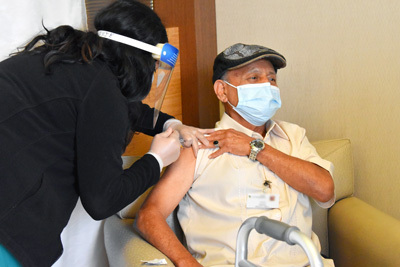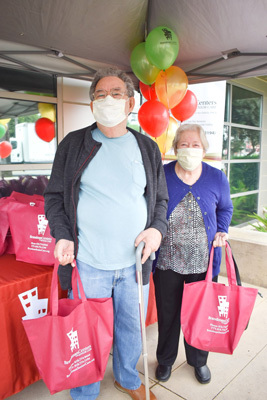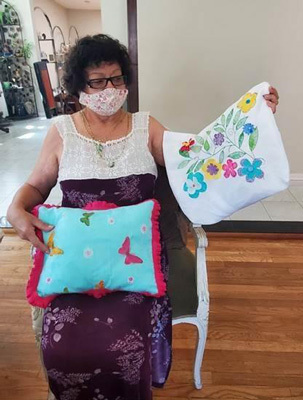Doors Open During Pandemic, Brandman Centers for Senior Care Offers Key Support for Seniors


Doors Open During Pandemic, Brandman Centers for Senior Care Offers Key Support for Seniors

As the pandemic took hold and impacted especially vulnerable populations across Los Angeles, one of the city's leading senior health and wellness facilities continued to be a stable source of support for the men and women in its care: the Brandman Centers for Senior Care (BCSC), a Program of All-inclusive Care for the Elderly (PACE).
Located on the Los Angeles Jewish Home's Grancell Village campus in Reseda, BCSC is a vital resource for nursing home-eligible seniors who are still able to live safely in their own homes, but may require special services. They turn to BCSC for a myriad of services including medical and psychological care, medical transportation, rehabilitation, social services, adult day activities, nutritional counseling, preventive health support, and more. During COVID-19, BCSC continued providing those services, playing an essential role in helping seniors meet their most critical needs.
"It's been a challenging time for our seniors, and they have depended on us for assistance," says Alicxa Manchan, BCSC's director of marketing. "The day center has remained open throughout the pandemic, but in a limited capacity, providing a safe place for participants at risk or those who's at-home caretakers were essential workers. We also saw participants in our clinic and therapy department, and kept in close contact with the seniors who were no longer coming to the day center but still relied on our care."

BCSC serves roughly 250 seniors on an ongoing basis; they have a median age of 80. Over the past year, the center continued enrolling new participants, working tirelessly to ensure they were staying healthy and connected to their community.
"For our seniors who were at home, we had to think out of the box about how to run our programs remotely, so we got creative, sending them all sorts of in-home activities and exercises to make sure they were staying mentally engaged," Alicxa says.
Some participants who are able to navigate technology were provided with devices equipped with FaceTime or Zoom that allowed them to access activities and complete their medical appointments using telehealth. BCSC also ensured seniors were well nourished and that they remained current with their prescription medications by sending participants meals to their homes every day and arranging for in-home medicine delivery.
Additionally, BCSC made certain that participants were able to receive vaccinations. "We had a drive-thru flu vaccine event in the fall, where seniors could be driven up, receive their shots, and head back home," Alicxa says. "And as soon as COVID-19 vaccines became available at the Jewish Home, we called participants to get them scheduled. We were so pleased to have over 90 percent participation."
Mobility can be difficult for BCSC participants, Alicxa notes, and center staff are invaluable in helping them get around. "For those who needed it, we provided transportation to all appointments at the center in order to make things as easy and seamless as possible," she says.

Focus on service is a key component of BCSC's appeal. "The major reason people enroll in our program is access to care," Alicxa says. "Our participants tell us in a normal Medicare Advantage plan they get maybe five or 10 minutes with their doctor. Our physicians here will often spend up to an hour with a patient. BCSC is also a one-stop shop—we have physical therapy on one side, our wellness clinic on the other, and in the middle is our center where we are running fun activities and serving meals. The other thing our participants love is the social aspect: engaging in activities, meeting peers, making friends. It's a wonderful way to spend their day."
As the pandemic shows the first signs of waning, all are eagerly looking ahead to a time when larger numbers of participants can once again gather at BCSC. "We're already developing schedules and devising ways to bring people onsite for our regular programming while maintaining social distancing," she says. "We can't wait to have them all back!"